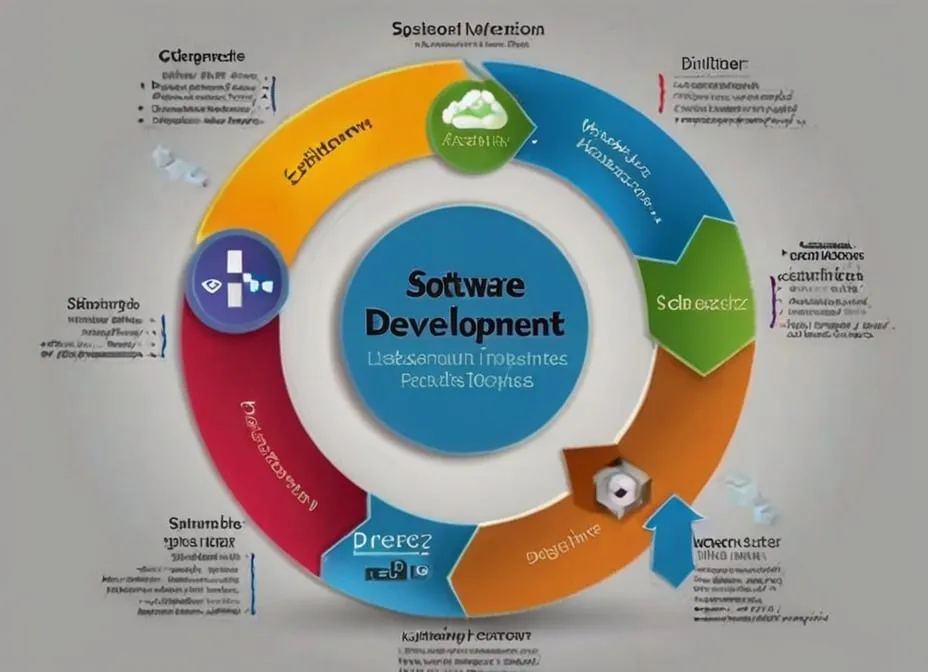AI in Business: Unleashing the Power of Intelligent Automation

I. Introduction to AI in Business
1.1 What is Artificial Intelligence (AI)?
Artificial Intelligence (AI) is a broad term that refers to the simulation of human intelligence in machines. It involves the development of computer systems that can perform tasks that typically require human intelligence, such as learning, problem-solving, decision-making, and perception.
AI has come a long way since its inception in the 1950s. Initially, it was focused on simple tasks like playing games or solving mathematical problems. However, with the advent of advanced algorithms, powerful computing resources, and vast amounts of data, AI has evolved into a transformative technology that is reshaping various industries, including business.
1.2 The Rise of AI in the Business World
The business world has been quick to recognize the potential of AI and its ability to drive efficiency, productivity, and innovation. As a result, AI has become a crucial component of modern business operations, with companies across various sectors investing heavily in AI technologies.
The rapid adoption of AI in business can be attributed to several factors, including the availability of big data, the need for automation, and the desire for data-driven decision-making. Additionally, the increasing computing power and the development of advanced machine learning algorithms have made it easier and more cost-effective for businesses to implement AI solutions.
1.3 Benefits of Adopting AI in Business
The integration of AI in business operations offers numerous benefits, including:
- Increased Efficiency: AI can automate repetitive and time-consuming tasks, freeing up human resources to focus on more strategic and creative endeavors.
- Enhanced Decision-Making: AI algorithms can process vast amounts of data and provide insights that can inform better decision-making processes.
- Improved Customer Experiences: AI-powered chatbots and personalized recommendations can enhance customer interactions and deliver more tailored experiences.
- Cost Savings: By automating processes and optimizing operations, AI can help businesses reduce costs and improve profitability.
- Competitive Advantage: Companies that embrace AI can gain a competitive edge by leveraging data-driven insights and innovative solutions.
1.4 Challenges and Concerns
While AI offers numerous benefits, its adoption in business is not without challenges and concerns. Some of the main challenges include:
- Data Quality and Availability: AI algorithms rely on large amounts of high-quality data, which can be difficult to obtain and maintain.
- Ethical and Privacy Concerns: The use of AI raises ethical questions related to privacy, bias, and transparency, which must be addressed.
- Skills Gap: There is a shortage of skilled professionals with expertise in AI, machine learning, and data science, making it challenging for businesses to implement and maintain AI solutions.
- Integration with Legacy Systems: Integrating AI technologies with existing systems and processes can be complex and costly.
- Trust and Acceptance: Some stakeholders may be reluctant to embrace AI due to concerns about job displacement or a lack of understanding of the technology.
Despite these challenges, businesses that can successfully navigate and address these concerns are well-positioned to reap the rewards of AI adoption.
II. AI Applications in Business Operations
2.1 Automation of Repetitive Tasks
One of the most significant applications of AI in business operations is the automation of repetitive tasks. AI algorithms can be trained to perform routine tasks with speed and accuracy, freeing up human resources for more complex and strategic activities.
For example, AI can be used to automate data entry and processing tasks, such as invoice processing, document management, and data extraction from various sources. This not only reduces the time and effort required for these tasks but also minimizes the risk of human error.
Additionally, AI can be applied to automate processes in areas like customer service, where chatbots can handle routine inquiries and provide basic support, reducing the workload on human agents.
2.2 Predictive Analytics and Data-Driven Insights
AI excels at analyzing large datasets and identifying patterns that can be used to make informed decisions. By leveraging machine learning algorithms, businesses can gain valuable insights from their data and make predictions about future trends, customer behavior, and market conditions.
Predictive analytics powered by AI can be applied in various areas of business operations, such as:
- Sales Forecasting: AI can analyze historical sales data, market trends, and customer behavior to predict future sales and adjust strategies accordingly.
- Inventory Management: AI can help optimize inventory levels by analyzing demand patterns, and supply chain dynamics, and forecasting future needs.
- Maintenance and Equipment Monitoring: AI can be used to predict equipment failures and schedule maintenance proactively, reducing downtime and extending the lifespan of assets.
- Risk Assessment: AI can analyze data from various sources to identify potential risks and vulnerabilities, enabling businesses to take preventive measures.
By leveraging predictive analytics, businesses can make more informed decisions, optimize operations, and stay ahead of the competition.
2.3 Customer Service and Chatbots
AI-powered chatbots have become increasingly popular in customer service, providing 24/7 support and addressing common inquiries promptly. These chatbots can be trained on vast datasets to understand natural language and provide relevant responses, improving the overall customer experience.
Chatbots can handle a wide range of customer service tasks, such as:
- Answering Frequently Asked Questions (FAQs): Chatbots can quickly provide answers to common questions, reducing the workload on human agents.
- Order Tracking and Status Updates: Customers can easily track their orders and get updates on delivery status through chatbots.
- Product Recommendations: AI-powered chatbots can analyze customer preferences and purchase history to provide personalized product recommendations.
- Appointment Scheduling: Chatbots can assist customers in scheduling appointments, reservations, or service calls, streamlining the booking process.
By implementing chatbots, businesses can offer efficient and cost-effective customer service while improving customer satisfaction and loyalty.
2.4 Supply Chain and Logistics Optimization
AI has the potential to revolutionize supply chain and logistics operations by optimizing processes and minimizing inefficiencies. AI algorithms can analyze vast amounts of data related to inventory levels, transportation routes, demand patterns, and weather conditions to make informed decisions.
Some applications of AI in supply chain and logistics include:
- Route Optimization: AI can identify the most efficient routes for delivery vehicles, considering factors like traffic conditions, weather, and customer locations, resulting in reduced transportation costs and faster delivery times.
- Demand Forecasting: By analyzing historical data and market trends, AI can accurately forecast demand for products or services, enabling businesses to optimize inventory levels and avoid overstocking or stockouts.
- Predictive Maintenance: AI can monitor equipment and machinery used in logistics operations and predict when maintenance is required, reducing downtime and extending the lifespan of assets.
- Warehouse Management: AI can be used to optimize warehouse layouts, inventory tracking, and order fulfillment processes, improving efficiency and reducing errors.
By leveraging AI in supply chain and logistics operations, businesses can achieve significant cost savings, improve customer satisfaction, and gain a competitive advantage.
III. AI in Marketing and Sales

3.1 Personalized Customer Experiences
AI has the power to transform the way businesses interact with customers by enabling personalized experiences at scale. By analyzing customer data, purchase history, and behavioral patterns, AI algorithms can create highly tailored marketing campaigns, product recommendations, and customer journeys.
Here are some examples of how AI can enhance personalized customer experiences:
- Targeted Advertising: AI can analyze customer data and preferences to deliver highly relevant and personalized advertising campaigns across various channels, increasing engagement and conversion rates.
- Product Recommendations: AI-powered recommendation engines can suggest products or services based on a customer's browsing history, past purchases, and preferences, improving the shopping experience and increasing sales.
- Personalized Content: AI can analyze customer data and generate personalized content, such as emails, newsletters, or website experiences, tailored to individual interests and needs.
- Chatbots and Virtual Assistants: AI-powered chatbots and virtual assistants can provide personalized support and recommendations based on customer interactions and preferences.
By delivering personalized experiences, businesses can improve customer satisfaction, build stronger relationships, and increase customer loyalty.
3.2 Targeted Advertising and Lead Generation
AI has revolutionized the way businesses approach advertising and lead generation. By leveraging machine learning algorithms and analyzing vast amounts of data, AI can identify and target specific audience segments with highly relevant and effective advertising campaigns.
Some applications of AI in targeted advertising and lead generation include:
- Ad Targeting and Optimization: AI can analyze customer data, browsing behavior, and preferences to identify the most relevant audience segments and optimize ad campaigns for maximum impact and return on investment (ROI).
- Lead Scoring and Prioritization: AI algorithms can analyze lead data and behavior to score and prioritize leads based on their likelihood of converting, allowing sales teams to focus their efforts on the most promising prospects.
- Predictive Lead Scoring: AI can predict which leads are most likely to convert based on historical data and behavioral patterns, enabling more effective lead nurturing and follow-up strategies.
- Content Optimization: AI can analyze data on content performance and user engagement to optimize content for better lead generation and conversion rates.
By leveraging AI for targeted advertising and lead generation, businesses can improve the efficiency and effectiveness of their marketing efforts, leading to higher conversion rates and better returns on investment.
3.3 Sales Forecasting and Pipeline Management
AI can be a powerful tool for sales teams, assisting in forecasting and pipeline management. By analyzing historical sales data, market trends, and customer behavior, AI algorithms can provide accurate sales forecasts and identify potential bottlenecks or opportunities in the sales pipeline.
Here are some ways AI can support sales forecasting and pipeline management:
- Sales Forecasting: AI can analyze various data points, such as past sales performance, market conditions, and customer behavior, to generate accurate sales forecasts, enabling better resource planning and goal-setting.
- Pipeline Analysis: AI can analyze the sales pipeline, identifying potential stalls or bottlenecks, and providing insights to help sales teams prioritize their efforts and optimize their strategies.
- Lead Prioritization: AI algorithms can score and prioritize leads based on their likelihood of conversion, allowing sales teams to focus on the most promising opportunities and allocate resources effectively.
- Sales Process Optimization: AI can analyze sales data to identify areas for improvement and recommend optimizations to the sales process, such as tailored outreach strategies or targeted follow-up techniques.
By leveraging AI for sales forecasting and pipeline management, businesses can improve their sales performance, increase efficiency, and make more informed decisions to drive revenue growth.
3.4 Content Creation and Optimization
AI is revolutionizing the way businesses create and optimize content for marketing and advertising purposes. AI-powered tools can assist in various aspects of content creation, from ideation and generation to optimization and personalization.
Here are some applications of AI in content creation and optimization:
- Content Generation: AI can be trained on vast datasets to generate human-like content, such as articles, social media posts, or product descriptions, saving time and resources for content creators.
- Content Optimization: AI algorithms can analyze data on user engagement, search intent, and content performance to optimize existing content for better search engine rankings, increased engagement, and improved conversion rates.
- Content Personalization: AI can analyze user data and preferences to personalize content for individual users, creating more engaging and relevant experiences.
- Content Recommendations: AI-powered recommendation engines can suggest relevant content to users based on their browsing history, interests, and preferences, increasing engagement and time spent on websites or platforms.
- Content Scheduling and Distribution: AI can assist in optimizing the scheduling and distribution of content across various channels, ensuring maximum reach and engagement.
By leveraging AI for content creation and optimization, businesses can produce high-quality, engaging content more efficiently, while also improving search engine visibility, user engagement, and overall marketing effectiveness.
IV. AI in Finance and Accounting
4.1 Fraud Detection and Risk Management
AI has become an invaluable tool in the finance and accounting sectors for detecting fraud and managing risks. By analyzing vast amounts of financial data and identifying patterns and anomalies, AI algorithms can help organizations proactively identify and mitigate potential fraud and risks.
Here are some applications of AI in fraud detection and risk management:
- Fraud Detection: AI can analyze transaction data, customer behavior, and other relevant data to identify suspicious patterns and potential fraudulent activities, enabling organizations to take prompt action and prevent financial losses.
- Anti-Money Laundering (AML): AI can assist in detecting and preventing money laundering activities by analyzing financial transactions, customer profiles, and other relevant data to identify potential red flags and suspicious patterns.
- Credit Risk Assessment: AI algorithms can analyze creditworthiness data, such as credit history, income levels, and financial behavior, to assess credit risks more accurately and make informed lending decisions.
- Cybersecurity and Threat Detection: AI can be used to monitor network activity, identify potential cyber threats, and detect anomalies that may indicate a security breach, helping organizations protect sensitive financial data and systems.
By leveraging AI for fraud detection and risk management, financial institutions and organizations can enhance their security measures, comply with regulations, and protect themselves from potentially significant financial and reputational losses.
4.2 Algorithmic Trading and Investment Analysis
AI has revolutionized the way trading and investment decisions are made in the financial markets. By analyzing vast amounts of data, including market trends, news, and historical patterns, AI algorithms can identify profitable trading opportunities and make informed investment decisions.
Some applications of AI in algorithmic trading and investment analysis include:
- Algorithmic Trading: AI algorithms can execute trades autonomously based on predefined rules and real-time market data analysis, enabling faster and more efficient trading decisions.
- Quantitative Investment Analysis: AI can analyze various financial data, such as company financials, market trends, and macroeconomic factors, to identify potential investment opportunities and make data-driven investment decisions.
- Portfolio Optimization: AI algorithms can analyze risk profiles, investment goals, and market conditions to optimize portfolio allocations and maximize returns while minimizing risks.
- Sentiment Analysis: AI can analyze news, social media, and other sources to gauge market sentiment and investor sentiment, providing valuable insights for trading and investment strategies.
By leveraging AI in algorithmic trading and investment analysis, financial institutions and investors can gain a competitive edge, make more informed decisions, and potentially achieve higher returns on their investments.
4.3 Automated Bookkeeping and Invoicing
AI has the potential to streamline and automate various accounting and bookkeeping tasks, reducing the time and effort required for manual data entry and processing. By leveraging AI, businesses can improve accuracy, increase efficiency, and free up valuable resources for more strategic activities.
Here are some applications of AI in automated bookkeeping and invoicing:
- Data Entry and Extraction: AI can be used to extract data from various sources, such as receipts, invoices, and bank statements, and automatically populate accounting software or spreadsheets, reducing the risk of human error and saving time.
- Invoice Processing: AI algorithms can automatically process incoming invoices, validate the information, and match the invoices to corresponding purchase orders or contracts, streamlining the accounts payable process.
- Expense Management: AI can analyze expense data, categorize expenses, and identify potential errors or anomalies, ensuring accurate expense reporting and compliance with company policies.
- Bank Reconciliation: AI can automate the process of reconciling bank statements with accounting records, identifying discrepancies, and providing insights into cash flow and financial health.
By implementing AI in automated bookkeeping and invoicing processes, businesses can reduce administrative overhead, improve accuracy, and gain valuable insights into their financial operations, enabling more informed decision-making.
4.4 Financial Forecasting and Budgeting
AI has become a valuable tool for financial forecasting and budgeting, enabling organizations to make more accurate predictions and informed decisions about their financial future. By analyzing historical data, market trends, and various other factors, AI algorithms can provide insightful forecasts and support effective budgeting processes.
Some applications of AI in financial forecasting and budgeting include:
- Revenue Forecasting: AI can analyze sales data, market conditions, and customer behavior to forecast future revenue streams, enabling businesses to plan accordingly and allocate resources effectively.
- Cash Flow Forecasting: AI algorithms can analyze historical cash flow data, accounts receivable and payable, and other relevant factors to predict future cash flow, helping organizations manage their liquidity and make informed financial decisions.
- Expense Forecasting: AI can analyze historical expense data, operational trends, and market conditions to forecast future expenses, supporting effective budgeting and cost management strategies.
V. AI in Human Resources and Talent Management

5.1 Recruitment and Candidate Screening
AI is transforming the recruitment and candidate screening process, enabling organizations to identify top talent more efficiently and effectively. By leveraging AI algorithms, businesses can streamline various aspects of the recruitment process, from sourcing candidates to conducting initial screenings and assessments.
Here are some applications of AI in recruitment and candidate screening:
- Candidate Sourcing: AI can analyze job descriptions, candidate profiles, and online data sources to identify and reach out to potential candidates who match the desired qualifications and skills.
- Resume Screening: AI algorithms can quickly scan and analyze resumes, cover letters, and other application materials to identify the most qualified candidates based on predefined criteria, reducing the time and effort required for manual screening.
- Applicant Tracking: AI-powered applicant tracking systems can automatically manage and organize candidate information, communicate with applicants, and schedule interviews, improving the overall efficiency of the recruitment process.
- Pre-Employment Assessments: AI can administer and evaluate pre-employment assessments, such as cognitive ability tests, personality assessments, and skill evaluations, providing objective and data-driven insights into a candidate's suitability for a role.
By leveraging AI in recruitment and candidate screening, organizations can improve the quality of their hiring decisions, reduce time-to-hire, and create a more efficient and effective recruitment process.
5.2 Employee Training and Development
AI can play a significant role in enhancing employee training and development programs, offering personalized learning experiences, and optimizing the overall effectiveness of training initiatives.
Here are some applications of AI in employee training and development:
- Personalized Learning: AI algorithms can analyze an employee's learning style, preferences, and performance data to create personalized learning paths and deliver tailored content, ensuring more effective knowledge acquisition and skill development.
- Adaptive Learning: AI-powered adaptive learning systems can adjust the pace, content, and difficulty level of training materials based on an individual's progress and performance, providing a more engaging and effective learning experience.
- Virtual Coaching and Mentoring: AI-powered virtual coaches and mentors can provide real-time feedback, guidance, and support to employees, facilitating continuous learning and skill development.
- Content Curation and Generation: AI can assist in curating relevant training content from various sources and even generate new content based on specific learning objectives and employee needs.
By incorporating AI into employee training and development programs, organizations can enhance the effectiveness of their learning initiatives, improve employee engagement and retention, and cultivate a skilled and knowledgeable workforce.
5.3 Performance Management and Feedback
AI can revolutionize the way organizations approach performance management and feedback processes, enabling more objective and data-driven evaluations, as well as continuous feedback and coaching.
Some applications of AI in performance management and feedback include:
- Performance Evaluation: AI algorithms can analyze employee data, such as productivity metrics, project outcomes, and feedback from peers and managers, to provide objective and unbiased performance evaluations.
- Continuous Feedback: AI-powered systems can facilitate continuous feedback loops, collecting and analyzing data from various sources (e.g., peer reviews, customer feedback, and project outcomes) to provide real-time feedback and coaching to employees.
- Goal Setting and Tracking: AI can assist in setting personalized and achievable goals for employees based on their strengths, development areas, and organizational objectives, and track progress towards those goals over time.
- Talent Identification and Succession Planning: AI algorithms can analyze employee performance data, skills, and potential to identify high-potential individuals and support succession planning initiatives.
By leveraging AI in performance management and feedback processes, organizations can foster a culture of continuous improvement, provide more objective and data-driven evaluations, and support the professional growth and development of their employees.
5.4 Workforce Planning and Optimization
AI can play a crucial role in optimizing workforce planning and ensuring that organizations have the right talent and resources in place to meet their business objectives.
Here are some applications of AI in workforce planning and optimization:
- Demand Forecasting: AI algorithms can analyze historical data, market trends, and business plans to forecast future workforce demands, enabling organizations to proactively plan and allocate resources accordingly.
- Skills Gap Analysis: AI can identify gaps between the skills and competencies of the current workforce and the skills required to meet future business needs, informing training and development initiatives.
- Resource Allocation: AI can analyze project requirements, employee skills, and availability to optimize resource allocation and ensure that the right talent is assigned to the right tasks and projects.
- Workforce Optimization: AI algorithms can analyze workforce data, such as productivity metrics, employee engagement, and turnover rates, to identify areas for improvement and optimize workforce strategies.
By leveraging AI in workforce planning and optimization, organizations can ensure they have the right talent and resources in place to achieve their strategic goals, while also improving operational efficiency and reducing costs associated with talent acquisition and management.
Conclusion
The integration of AI in business operations is no longer a futuristic concept but a reality that is transforming industries and driving innovation. From automating repetitive tasks and optimizing processes to enabling data-driven decision-making and personalized customer experiences, AI has proven to be a game-changer for businesses of all sizes and across various sectors.
As AI technologies continue to evolve and become more sophisticated, businesses that embrace AI will gain a significant competitive advantage. However, it is crucial to address the challenges and concerns surrounding AI adoption, such as data quality, ethical considerations, integration with legacy systems, and the skills gap.
Successful AI implementation requires a strategic approach, involving stakeholder buy-in, clear objectives, and a commitment to continuous learning and adaptation. Additionally, businesses must prioritize responsible and ethical AI practices, ensuring that AI solutions are transparent, unbiased, and aligned with organizational values and societal expectations.
The future of business is inextricably linked to AI, and those who embrace this transformative technology will be well-positioned to drive innovation, enhance efficiency, and deliver exceptional customer experiences. As the capabilities of AI continue to expand, businesses must remain agile and adaptable, continuously exploring new ways to leverage AI to achieve their strategic goals and stay ahead of the competition.
FAQs
- What is the role of AI in improving customer experiences? AI plays a crucial role in enhancing customer experiences by enabling personalization at scale. AI algorithms can analyze customer data, preferences, and behavior to deliver tailored recommendations, personalized content, and targeted marketing campaigns. Additionally, AI-powered chatbots and virtual assistants can provide 24/7 support and personalized assistance, improving overall customer satisfaction and loyalty.
- How can AI help with employee training and development? AI can revolutionize employee training and development by providing personalized learning experiences and adaptive learning systems. AI algorithms can analyze an employee's learning style, preferences, and performance data to create tailored learning paths and adjust the content and difficulty level accordingly. AI-powered virtual coaches and mentors can also provide real-time feedback and guidance, facilitating continuous learning and skill development.
- What are the benefits of using AI in financial services? AI offers numerous benefits in the financial services industry, including improved fraud detection and risk management, enhanced algorithmic trading and investment analysis, automated bookkeeping and invoicing processes, and more accurate financial forecasting and budgeting. AI algorithms can analyze vast amounts of financial data, identify patterns and anomalies, and provide valuable insights to support informed decision-making and mitigate risks.
- How can AI assist with recruitment and candidate screening? AI can streamline and optimize the recruitment and candidate screening process by automating tasks such as candidate sourcing, resume screening, applicant tracking, and pre-employment assessments. AI algorithms can quickly analyze candidate data and application materials to identify the most qualified individuals based on predefined criteria, reducing the time and effort required for manual screening.
- What are the challenges associated with AI adoption in business? While AI offers numerous benefits, its adoption in business is not without challenges. Some of the main challenges include data quality and availability, ethical and privacy concerns, the skills gap in AI and machine learning expertise, integration with legacy systems, and establishing trust and acceptance among stakeholders. Addressing these challenges requires a strategic approach, clear communication, and a commitment to responsible and ethical AI practices.










